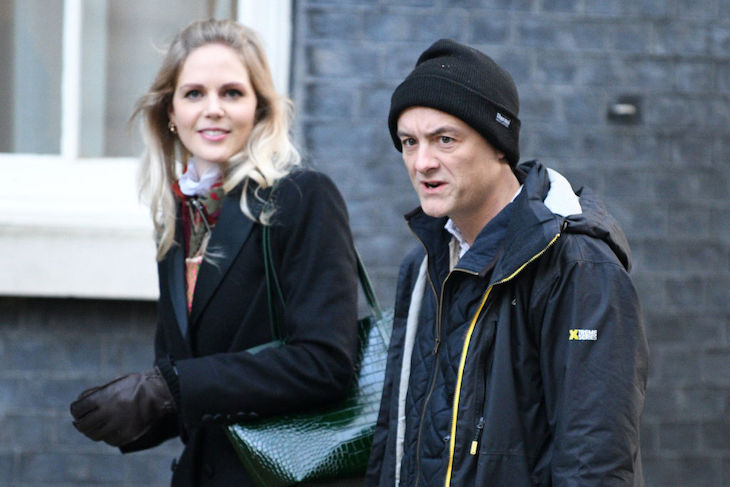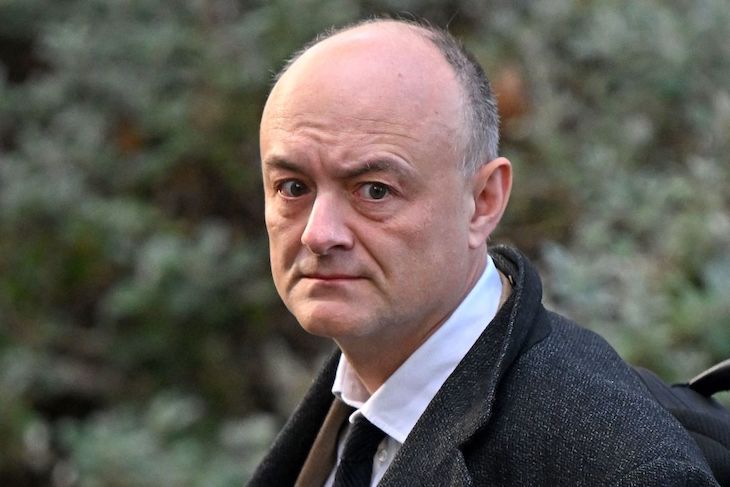Sometimes it’s tricky to be a friend of Dominic Cummings, especially if you’re also friends with Helen MacNamara. I worked with them both in government during the Covid pandemic and couldn’t have more admiration for either of them. I can remember with absolute clarity Dominic explaining in March 2020 how the NHS would crumble without a swift change of strategy. Helen was boundless in her support and sense. She was the most senior woman by a mile who, yes, had to argue for everything, from proper PPE for women to changing the rules on births and miscarriages to allow partners to attend, rather than open up pheasant shooting (incidentally Dominic agreed with her).
The last two days of watching the Covid inquiry have been grim, particularly if you care for both Dominic and Helen – so I can’t even imagine what it has been like for the bereaved families. Fundamental failures have been exposed, as Baroness Hallett looks into what went on in government during the early days of Covid, from the dismal Cabinet Office preparation plans to the suitability of certain ministers (prime, health or otherwise) to do their jobs. But the inquiry – likely the largest, most expensive and longest running of its kind – and the media coverage of it, is descending into exactly what we don’t need: personality over purpose. The fact that, in the short time the KCs had to question the pair, they spent any time on the well-trodden themes of Barnard Castle and Partygate, is incredibly frustrating.
Like Helen, I was often the only woman in a room over the course of my career
Both Helen and Dominic wrote lengthy statements of well over 100 pages each. These outlined, in devastating detail, problems with how our country is run and how these failures, under the pressure of Covid, nearly crippled us. In their statements, Helen and Dominic agree on everything important. Yet There was no plan is not what dominates the headlines. They have been colourfully pitted against each other, meaning the rotten system and culture they were in escapes scrutiny. I’m team Helen and team Dominic, as they both worked tirelessly to save lives in a system that was hopelessly underprepared. It is certain that, without them both in their roles at the time, countless more people would have died.
Tragically, pulling together could be difficult. Covid created a perfect storm of stress, pressure, and institutional conflict. With an absence of clear leadership, Helen, Dominic and many others were pitted against each other at various points. Sometimes this manifested as a healthy plurality of views around the table, something we all agree is important. However, other times, as the messages Dominic exchanged with Boris Johnson about Helen show, respect and reason fell away. Those texts are, exactly as Helen says, ‘horrible to read’ and I’m glad he’s apologised for them.
No one would, or should, condone this language. Aside from the hurt it has caused Helen, it paints an extremely negative picture of politics at a time when it is already difficult to attract women into Westminster.

However, while I think Dominic can be many things (insert some of his own well-chosen language here), in my experience he went out of his way to empower the women he worked alongside, promoting women into teams he built and calling out belittling behaviour against junior women. In early 2020, he tasked me with identifying talented, overlooked female MPs to promote in the upcoming reshuffle. Perhaps I would say all this, as a known ally of the man. But many of the women who have worked with him in government – all of whom have deep respect for Helen; some are her friends – have said the same thing to me.
‘Dom was great to work with,’ said Pamela Dow, a former civil servant with first-hand experience of Dominic in the Department for Education from 2010 and then in the Cabinet Office from 2019-2022. ‘He is gender, rank, age and colour blind. His candour and self-awareness were refreshing in a culture of doublespeak and passive-aggression. Whitehall, Westminster and the world is full of women whose careers and professional skills thrived from working with Dom in Government.’
Dominic explained himself to the inquiry by saying he was ‘much ruder about men’. Munira Mirza, the former Director of the Number 10 Policy Unit, explains this a little better:
‘Dom was an equal opportunities martinet. He was scathing about anyone who was screwing up or blocking things in the system but I’d say he generally punched up rather than down and he was always courteous to junior civil servants.’
Those who are still officials, understandably, wanted to keep their remarks anonymous. One former colleague of his ‘from the get-go Dom was nothing short of actively supportive and empowering – a magnitude greater than anyone else at that time. He went out of his way, regularly, to personally ensure I was OK, where I needed to be, and able to crack on, in an environment that was regularly conducive to the opposite.’
All Number Tens reflect the principle, and culture is set at the top. Under Theresa May, though hardly perfect, the fact the most weighty voice at the table was a woman is significant. Several of her top team were women, including her chief of staff, deputy chief of staff and director of communications. Under Boris Johnson, it was different. I certainly don’t think he had any intention to create a culture that left women out, but I don’t believe it was a priority of his to include them in decision making. As Helen’s testimony makes clear, this lack of diversity had real-world outcomes.
Helen is absolutely right, too, to talk about a macho culture in government. For the most part, politics is littered with misogyny and sexism – long before and since Dominic’s time. Within months of taking my first job in Downing Street, the 2017 Pestminster scandal had hit, shortly followed by grim briefings against the then-PM Theresa May by her own MPs, advising her to ‘bring a noose’ to a meeting of the 1922 Committee. And, of course, there was George Osborne’s vow that he would not rest until Mrs May was ‘chopped up in bags in my freezer’. Anyone keeping an eye on the news can see that, regrettably, things have not improved years later. Like Helen, I was often the only woman in a room over the course of my career. In a simple numbers game, there just aren’t enough women in Parliament and government, particularly at the top. And we’re shedding the brilliant ones that we have, Pamela and Helen among them.
I suppose that isn’t for this inquiry to get into, but the systemic need and failure to get women into and upwards in government and Parliament deserves serious scrutiny. I can think of an extremely talented, fair-minded former senior civil servant to chair such a discussion.
For now, though, we desperately need the Covid inquiry to get to the bottom of how and why the British state failed the public during Covid. Hopefully the next chapter will focus on what people did, rather than what they said – and how we can avoid a repeat of this utter disaster.






Comments